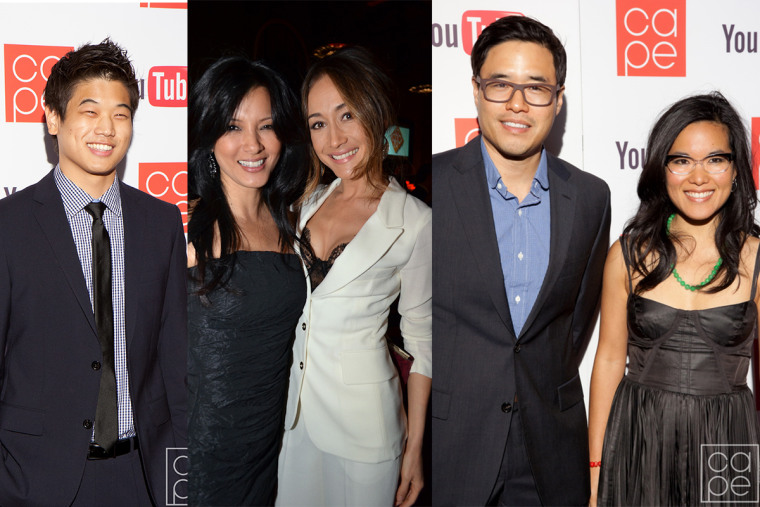If the initial meeting that inspired the Coalition of Asian Pacifics in Entertainment (CAPE) was told as a screenplay, it would read something like this: “Interior — The Mandarin, an upscale Chinese restaurant in Beverly Hills. October 1991. A group of Asian American and Pacific Islander (AAPI) entertainment professionals and community activists, including Fritz Friedman, Wenda Fong, and Chris Lee, gather in a private room to discuss advancing AAPIs in Hollywood.”
It would then be followed by a time lapse, fast forwarding to three weeks later when CAPE held its first networking party.
“Ninety Asian American [and] Pacific Islanders showed up, and many of these people thought they were the only two or three in the business. So, when they walked into this room and saw 90 people, there were people that were in tears,” co-founder and board member Wenda Fong told NBC News.
Fong, along with founding members publicist Fritz Friedman and film producer/executive Chris Lee, said the inspiration for starting CAPE was partly driven by her own experience as a TV producer for African American-targeted programs. After observing the way the African-American community rallied together to support each other’s projects, she thought the AAPI community could follow suit.
RELATED: 2015 Was More Than Just a Banner Year for Asian Americans on Television
While CAPE first began as a networking group, it has since evolved its platform to promote AAPIs through its slate of programs, such as the New Writers Fellowship: for six weeks, screenwriters develop scripts, network with industry leaders, and learn practical skills for writing and pitching.
“Diversity starts on the page. If we can get more of our community into these writers’ rooms as part of the conversation and at the table, that’s how we can start building that,” executive director Michelle Sugihara told NBC News.
The program has helped funnel its alumni into other writing programs at major networks: several fellows have gone on to write for shows including CBS' “Hawaii Five-0,” NBC's “The Blacklist,” and NBC's “Hannibal,” in addition to successfully developing film and TV projects.
The #IAm campaign, a web series now in its third season, highlights AAPIs in front of the camera like Constance Wu, Daniel Dae Kim, and Harry Shum, Jr. The series led CAPE to partnering with the White House Initiative on Asian American Pacific Islanders on its 2015 anti-bullying campaign, #ActToChange.
Aaron Ho, a recipient of the 2009 CAPE New Writers Award for TV, credits CAPE for launching his career in scripted television writing and producing. (The awards have since been replaced with the fellowship program.) Shortly after winning, Ho joined the Disney ABC Television Writing Program. His credits include writing and producing for ABC’s “Cougartown” and Disney's “Austin & Ally.”
“They were the first people to really welcome me with open arms and really believed in me and showed me that this industry is full of [fellow Asian Americans],” Ho told NBC News.
RELATED: Asian Americans Show Impact of Being #WhitewashedOUT
He says the organization’s mission feels especially important lately, as AAPIs become more vocal about fair representation in Hollywood.
“Any time an executive says something ignorant like, ‘There aren’t any Asians that can fill these roles or there aren’t any bankable stars or enough Asians in the industry to make it worthwhile to invest in them,’ CAPE is so important. Because they can say, 'No, we can send you a whole list of people you can trust in and invest in and have the talent,'” he said.
"If we can get more of our community into these writers’ rooms as part of the conversation and at the table, that’s how we can start building that."
The largely volunteer-run organization (CAPE employs two paid staff members) hopes to not only impact writers’ rooms but also boardrooms. Next year, it will launch the Young Leaders Fellowship where junior media executives can network and train to enter into top industry positions. Its board of directors already includes prominent industry leaders such as Albert Cheng (COO, Amazon Studios) and Eric Kim (VP of Current Programs, CBS Television Studios).
“We need people in the C-suites who have the power to greenlight the projects and have people say, 'Yes, this is what needs to be shown, these are the stories that need to be told.' And from that, we create jobs for the actors, producers and directors,” said Sugihara about the fellowship, which will be spearheaded by the board’s senior members.
For co-founder Fong, the fact that CAPE has evolved into a movement that champions AAPI voices in Hollywood can be summed up in one word: thrilling.
RELATED: Celebrating Its 50th Theater Season, East West Players Looks to the Future
“At our 10-year-anniversary, I told the other founding members, 'If we make it to 25, we’ll just have a big party.' It was something we didn’t think would happen,” she said.
On Oct. 22, CAPE will be celebrating its 25th anniversary with a gala in Los Angeles featuring celebrities such as the "Fresh Off the Boat" cast, Wong Fu Productions, and actress and creator Anna Akana.
“Some people think, 'Entertainment? How does that affect me? How does that affect my children?' They don’t realize that having your face on television, on film, in the digital world affects how many people perceive us and how we perceive ourselves,” Fong said. “Where we are, it is so thrilling. But there is still so much more to do.”
Follow NBC Asian America on Facebook, Twitter, Instagram, and Tumblr.
